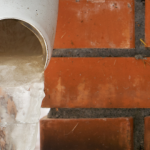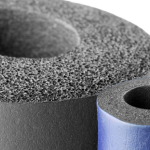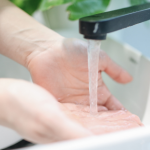Don't Allow Frozen Pipes To Ruin Holiday Celebrations!
A single frozen pipe can lead to thousands of dollars in damage. And it doesn't take long. Even a few minutes can do extensive water damage to a home's walls, floors, and ceilings. Not to mention the problem of getting the pipe fixed or replaced.
Unfortunately, frozen pipes happen every year, and not just exposed outdoor pipes. It can happen to indoor pipes, as well. But, here are the three top ways to prevent frozen pipes this winter. They are all fairly simple, the hard part is remembering to do them!
Properly Insulate Pipes

A home wouldn't do well without insulation in the walls. The cold would seep inside easily, making the home uncomfortable for the people inside. Not to mention running up the heating bill. The same can be said for pipes. Without insulation, the chances that they will freeze are much higher. And a frozen pipe can do a ton of damage in a short period. Luckily, insulating pipes is pretty easy. Even those who don't consider themselves "DIY types" can get this done in a couple of hours.
Pre-cut foam insulation from the local home improvement store is generally the easiest way to get this done. Pipes outdoors, in basements, garages, and attics should be insulated first. These pipes are the most vulnerable as they aren't protected much by the warmth of the house. For those partially-exposed outdoor pipes, spray foam insulation may be the best way to go for added protection.
Allow Water To Drip From Faucets
In addition to ensuring proper pipe insulation, homeowners should consider letting their faucets drip. This is especially important during extremely low temperatures or a cold-snap. For one, the slow running water makes it harder for ice crystals to form, which can help prevent a frozen pipe. This also reduces the amount of water pressure in the pipes.

A buildup of pressure behind an ice blockage in a pipe is why pipes burst in the winter. It's common for a pipe to burst inches or feet away from the actual ice blockage. So, homeowners should let their faucets drip during very cold weather.
Keep the Thermostat at 55 Degrees F or Higher
The final tip for preventing frozen pipes has to do with keeping a consistent temperature in the house. By keeping the thermostat above 55-degrees Fahrenheit, homeowners can use the warmth generated by the heater to keep their pipes from freezing. This tip is often used when people go out of town or are away from the house for several hours. After all, 55-degrees is a little cold for most people when they are at home.
For those leaving the house, opening up the cabinet doors and any other interior doors can help the home's warmth spread. Any room of the home with plumbing fixtures should have its door open to allow warmth to protect the pipes.
About Captain Rooter Emergency Plumbers Chicago
Captain Rooter Emergency Plumbers Chicago has been proudly serving Chicago, IL, since 1998. Their expert technicians are always courteous, communicative, and ready to please. They offer free estimates, upfront pricing, and guaranteed quality workmanship on every job, no matter how big or small. Call them now for expert pipe services.















